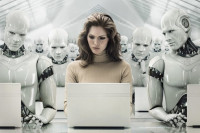
Humans are continuing to grow their reliance on technology as each year passes, but as we enter the realm of commercialisation of cyborgs, are we ready to work side by side with our robot counterparts? We’ve seen it all before in the movies; we build the technology, we work alongside the technology and then they surpass our intelligence and ultimately take overall control and we work for them. This may be a grim outlook on our future but could this possibly be the reality? Are we on the brink of a 4th industrial revolution?
Since 1955 Artificial Intelligence has slowly been introduced into our lives in many shapes and forms. Computer scientist John McCarthy introduced the term AI to mankind through his invention of the machine. His intent was to create a machine that would recreate a human function, a machine that could reason like a human, in both problems solving and self-improvement. This invention was the blueprint for all of the technologies that we are presently using in our everyday lives today.
Though the reality is this technology, which was created, to imitate human function is now replacing us. Devices such as smartphones, customer service kiosks, and driverless cars are providing us with interactions and connections that humans once needed and relied upon from another person. Instead we are now accustomed to artificial intelligence providing a service that is more precise, efficient and more cost effective than what another human being could provide.
Though ask yourself this. Did our focus on the benefits of Artificial Intelligence make us lose sight of the growth and reliance built on technology in terms of the loss of jobs in our future? High-profile figures like Stephen Hawkings and Elon Musk have predicted that the era of technology is upon us; there will be an elimination of jobs on a worldwide scale. We now walk into offices to be welcomed by a white stationery box with a screen providing us with a customer ticket for a seat in the waiting area. We call up a customer helpline to be greeted by an automated phone system which directs your call to the correct area based on your verbal commands. It’s fair to say that the jobs being targeted at the moment are administration and customer service based.
Computer Scientist Ray Kurzweil created a theory for when AI will surpass mankind and the coined term is known as "Singularity". It's predicted to take place in 2054, though looking at our current technological state this takeover date looks to be closer to 2030. According to a study by CEDA figures indicate that by 2030, 4 million jobs will be automated in Australia and around 38% of jobs in the US will be automated with financial services being the hardest hit with 61% being replaced by robots.
Currently, there is a growing fear that humans will lose their jobs to AI. But if history proves one thing, we are able to survive a mass scale elimination of jobs. Take a look at the industrial revolution which took place in 1760, it created a sense of fear and uncertainty on a global scale. Workers saw the deployment of machinery in farms and factories which replaced their jobs. Machines were producing goods and harvested crops in half the time a human worker could. A great deal of jobs were lost to the machines which meant poverty was rife. In order to get jobs workers adapted to the new technology and learnt skills that would allow jobs to be created around the machines. Eventually the Industrial Revolution ended in the mid 1800's and what was learnt can give an indication of how we as a global workforce can tackle the imminent technology changes. We need to be ahead of the technology changes and learn skills right now in order to work together with artificial intelligence in the future.
To give you examples of what Australia's future job landscape is looking like, here are some automated technologies that have been introduced so far. The construction industry will introduce a single machine that can lay out 1000 bricks in an hour. While in Western Australia, Curtin University has the first autonomous driverless cars on campus. Both of these new technologies will eventually cause a loss in jobs that humans once worked, but new jobs will be created. There will be a need for developers to program the technology and mechanics to maintain the machines.
Between 2001 - 2015 an analysis was conducted by Deloitte which showed that 800,000 jobs were automated and 3.5 million new technology jobs were created within that period. This data is a fair indication that we shouldn't be focussing on the fear of technology advancement in the workplace, but embrace it and learn from it.






